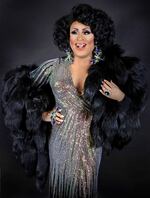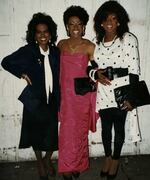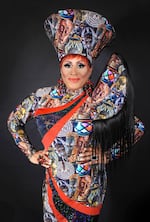As far back at the 1940s, there was already a thriving LGBTQ+ community in Portland. But at the time, it was largely underground. A small triangle of streets in Southwest Portland became a de facto gathering spot for the queer community with venues like Schneiderman’s Music Hall, hosting classic vaudeville acts as well as drag performers.
Through the ’60s and ’70s, a stretch of what’s now Harvey Milk Street was home to many queer watering holes, and by 1976, LGBTQ+ organizers had created the city’s first gay rights march.
By 2020, the city’s iconic drag club Darcelle XV Showplace was designated a national historic site for its role in the Portland’s LGBTQ+ history.

Poison Waters, aka Kevin Cook, explores the history, politics, and artistry of drag in the Pacific Northwest in new course being taught at Portland Community College.
Carlos Silvas / Courtesy: Poison Waters
This is where Kevin Cook comes in. You may know him better by his drag alter-ego, Poison Waters, who is also the co-hostess at the Darcelle XV Showplace. Since the late 1980s, Cook has been a performer, emcee and community activist. And now, add one more title to that list: professor.
This summer he’ll be teaching a three-week class at Portland Community College called “Histories of Drag Performance in Portland.” He joined OPB’s “All Things Considered” host Tiffany Camhi to talk about the course.
You can listen to the full conversation using the audio player at the top of this story. Here are highlights:
Tiffany Camhi: Let’s just start out with the advent of Poison Waters. How did she come about?
Kevin Cook/Poison Waters: So Poison Waters came out of my imagination and my ego and my desire to shine at all times. I came out right after high school, and I grew up in Parkrose. I went to Mount Hood Community College out in Gresham. I had never been to downtown Portland, to the night clubs. When I met folks at Mount Hood, they said, “Come with us to the city.” I thought the city meant downtown Portland. But it was a nightclub called The City Nightclub [that had] dancing, same-sex couples dancing, and it just blew my mind. They would have these drag shows and I didn’t understand them. It kind of freaked me out, and I didn’t really like them. Then, one time, they had special guest drag queens from Darcelle’s and Embers — places I’d never heard of — and they were four beautiful Black performers, three drag queens and trans-women. It was the first time I saw someone that looked like me in the drag realm, and that just blew my mind. That’s where Poison Waters was born. That was in 1988, and it was the time of so many wonderful things, [but] also a time of so many horrible things with AIDS and HIV running rampant through our community. So, it was a great opportunity for me to learn from these wonderful people that soon would be taken away from us. So, I had about five or six years with those ladies, my best friends that unfortunately died in the early 90s.
Camhi: So it sounds like you had some some really great mentors to look up to, not only people who were queer, but also who were Black.
Cook/Waters: Correct, which was unheard of for me coming from Parkrose. So to find these beautiful souls and to see them out of drag as men living their lives and being prosperous and professionally successful, it just showed me that the color of my skin and my sexual orientation wasn’t going to hold me back as a person. Whereas, I think growing up, I was told “you’re not going to be much, you’re not going to have opportunities.” So learning from them, listening to them and being scolded by them when necessary was really important to my upbringing and who I am today.

Misty Waters, Poison Waters, and Rosey Waters at The City Nightclub in the late 80's.
Photo courtesy of Kevin Cook / Photo courtesy of Kevin Cook
Camhi: Let’s talk about the class you’re going to teach at Portland Community College this summer. How did that come about?
Cook/Waters: The end of last year, I got a email from somebody at PCC saying, “Hey, we have this wild idea. Would you like to teach a class on the Portland drag history?” I said yes, and I thought, “Oh boy, what have I got myself into?” But then I realized, I’ve been really close friends with Darcelle since 1990, so who better to tell me the drag history? All of these 33 years I’ve seen and heard so many wonderful stories from him and other people close to his age, from the drag community that I’ve befriended over the decades and so I felt like I had a good front row seat to the history. But what I didn’t know was that there were decades of history of drag before. So when I sat down to start doing the research, I found photos and documentation and writing from like 1912 of drag here in the City of Roses.

Kevin Cook may be better known by his drag alter-ego Poison Waters. Waters is also the co-hostess at the Darcelle XV Showplace and has been performing in Portland since the 1980′s.
Carlos Silvas / Courtesy: Poison Waters
Camhi: Are there any particular moments in Portland’s history regarding drag that you see as essential to this class?
Cook/Waters: Well, I think what’s really important to know [is that] drag is everywhere. It’s on every corner. It’s in hotels and bars and restaurants, doing brunches and shows and whatnot. It’s in all of our television shows and movies. But I think it’s really important, especially for the younger folks that come to my class, to realize drag isn’t new. It wasn’t invented on Rupaul’s Drag Race. There are decades and literally centuries of drag before what we have today. Also, I think it’s important for people to know that people in drag in the 1930s and 1940s would be arrested. Their names would be printed in the paper. So their lives would be ruined. Their families, their jobs, their social status, it would all be ruined. So while now, drag is so casual and it’s everywhere and so accessible, it’s important for people to realize we are able to do what we do because of those people that sacrificed their lives and livelihoods back in the day.
Camhi: June is Pride month. How do you want to see allies of the LGBTQ+ community participate in Pride and support the community?
Cook/Waters: Allies are so important to all of us, to the community. The most important thing an ally can do is let it be known that they’re an ally. Growing up queer and in Portland, we’re kind of geared towards not trusting the elders in our life, not trusting the people who have leadership roles in our life. So if you’re a teacher or you’re a boss, a supervisor, it’s great that you’re an ally and it’s great to stand up for us in your community, in your social circles and maybe in your church and your family. But if we don’t know you’re an ally, we don’t get to absorb that power too. I think allies really need to say, “Hey, queer person in my life: I’m an ally and I’m here for you.” That’s so empowering for people in the LGBTQ+ community to hear that. To look a queer person in the eye and say, “Hey, I’m here for you, what can I do?” I think that is fantastic.